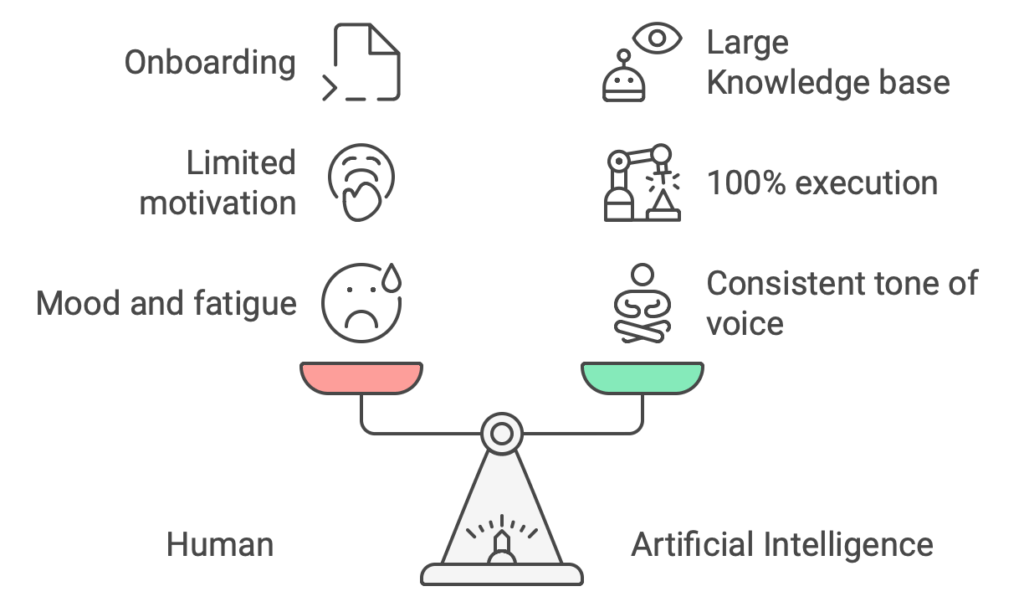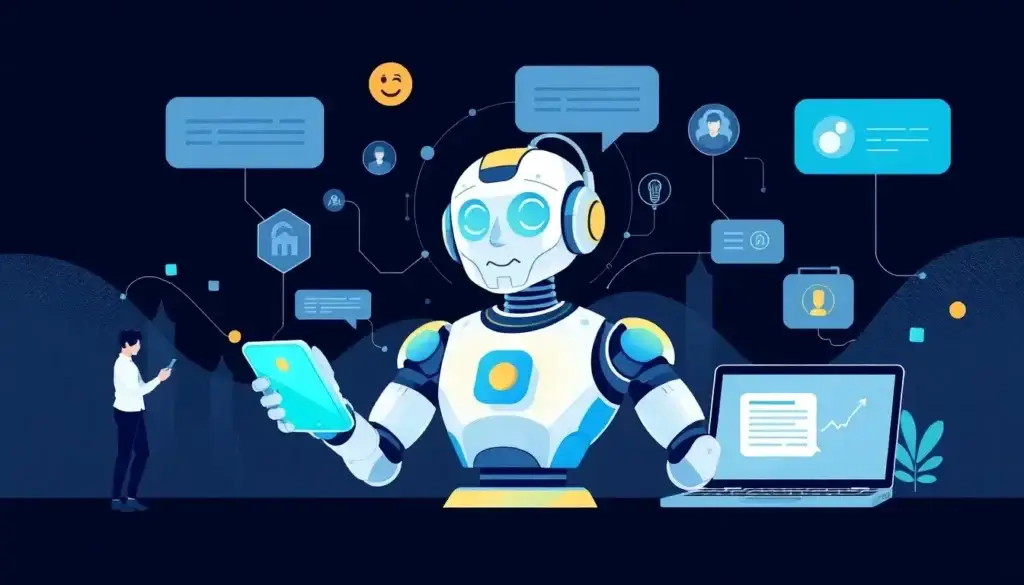The rise of artificial intelligence (AI) is revolutionizing how businesses handle routine tasks. Just a few years ago, it seemed impossible to replace human interaction with customers. Today, AI-driven chatbots and voice assistants are doing just that, often outperforming sales managers in both efficiency and quality. So, what are the advantages of AI, and why are traditional customer communication methods becoming less effective? Let’s explore the key factors driving this transformation.
The Human Factor: Mood, Attention, and Fatigue
Sales managers are, first and foremost, human. This means they are subject to emotions, mood swings, and external influences. Stress, fatigue, and other factors can negatively affect the quality of customer interactions, often leading to misunderstandings and dissatisfaction. Even the most professional employees can lose their focus and enthusiasm by the end of the day.
Employee motivation also plays a significant role. Sales professionals who are dissatisfied with their compensation or lack support from leadership are less likely to go the extra mile for customers. This leads to fewer leads being processed and lower conversion rates, which in turn increases the cost of customer acquisition.
According to a study by McKinsey, customer experience in B2B sales is more than three times as important as sellers estimate it to be. This discrepancy underscores the limitations of relying solely on human sales teams to deliver consistent, high-quality experiences.
Competence and Knowledge
Many sales teams are trained to follow predefined scripts and scenarios, especially when handling objections. But what makes them different from AI assistants? Humans are limited in the number of templates they can memorize and use effectively, while AI can pull real-time data from CRM systems and corporate databases to provide personalized, accurate, and up-to-date information instantaneously.
Another challenge is product knowledge. Finding salespeople who possess both deep technical expertise and effective sales skills is difficult, and they come at a high cost. This challenge is magnified in multilingual environments, where qualified staff are even harder to find. AI, on the other hand, can overcome these barriers by offering instant access to vast knowledge bases and seamlessly switching between languages.
Inattention and Mistakes
Sales are more than just talking to customers; after each conversation, the interaction needs to be analyzed, logged into the CRM system, and followed up with a recap email. This phase often presents challenges, as it requires time and involves routine tasks that many employees prefer to skip.
Most salespeople focus on “hot leads,” neglecting colder ones, which can result in missed opportunities. AI solves this problem by consistently following established processes, recording all critical details, and ensuring that the customer receives a follow-up summary, additional materials, or a proposal within minutes of the conversation.
Employer’s Perspective: Team Management and Costs
Managing a sales team comes with its own set of challenges: high turnover rates, the need to recruit and train new employees, and the ongoing task of keeping them motivated. Additionally, sick days and vacations can disrupt the sales process.
In B2B settings, the cost of sales team salaries typically accounts for 30% to 60% of customer acquisition costs (CAC), and in small businesses or startups with less automation, the percentage can be even higher. By offloading customer-facing tasks to AI, companies can significantly reduce salary expenses while also building a more resilient sales process that isn’t vulnerable to employee availability.
The Customer Perspective: Introverts, Pressure, and Independence
Many customers prefer to avoid direct communication with salespeople. Some don’t want to bother someone, while others fear appearing uninformed or encountering a pushy representative. This is particularly true for introverted individuals who feel uncomfortable speaking with strangers.
According to Gartner, 44% of customers prefer to make purchases without any direct interaction with a sales representative.
AI chatbots and voice assistants solve this problem by allowing customers to control their interactions, giving them the freedom to ask questions and make decisions at their own pace, without feeling pressured. This is particularly valuable for handling warm and hot leads since every minute of delay can reduce conversion rates.
How AI Transforms Customer Communication
- 24/7 Availability and Scalability
AI-driven chatbots and voice assistants are available around the clock, providing global customer support in multiple languages. They don’t require breaks, vacations, or sick days, ensuring uninterrupted service. - Engaging and Personalized Customer Experiences
AI solutions can analyze customer data in real time, ask the right questions, and guide customers through the sales funnel more efficiently. They can assess where the customer is in the buying process and offer personalized, timely recommendations that are more likely to result in a purchase. - CRM Integration and Deep Customer Insights
AI automates sales and marketing processes by integrating seamlessly with CRM systems. It can replace certain human decision-making steps, offering highly accurate customer scoring and decision-making based on data analysis.
According to Forrester, by 2025, 85% of customer interactions will take place without human involvement.
AI chatbots and voice assistants for sales and marketing automation

The Future of Sales and Marketing Automation
The rise of AI presents opportunities to exponentially increase human and team productivity. However, AI is just a tool—it must be strategically integrated into a company’s processes to achieve results that align with long-term business goals. By leveraging AI-powered tools like chatbots and voice assistants, businesses can not only improve customer interactions but also reduce costs and mitigate risks associated with human error and turnover.
For companies looking to stay ahead of the curve, embracing AI as a cornerstone of their sales and marketing strategy is no longer optional—it’s essential. AI will continue to redefine how we engage with customers, ensuring that businesses remain competitive in a rapidly evolving market.
If you’re ready to explore how AI can transform your customer communication, Be Digital is here to guide you through every step. Visit Be Digital and contact our team to learn more about how we can help you harness the power of AI for your business.
Join our growing community!
Follow us on LinkedIn, X, and Facebook to stay updated on the latest AI trends, insights, and success stories.

